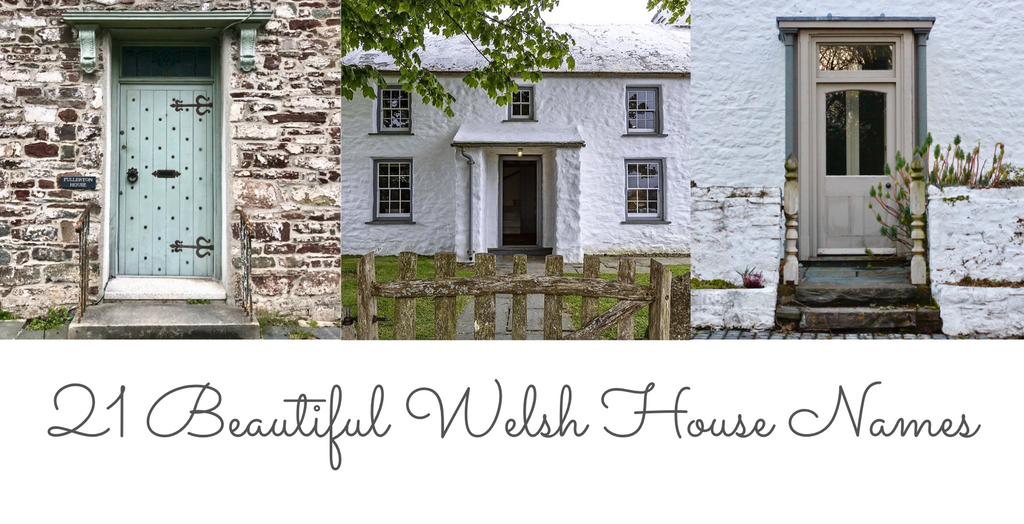
There are some beautiful Welsh house names out there - some wonderfully poetic, others reflecting local history, folklore, or previous occupants long gone. According to the Halifax House Name survey, the most popular of all house names in Wales is 'Cartref' - literally meaning 'home'. But others are a lot more inventive than that- here are some of our favourites!
(Huge thanks to Edwin C. Lewis who wrote 'A Pocket Book of Welsh House Names' from which this list is derived).
1. Adar-y-nos (Birds of the night): A busy family might have lived here, who worked through the night and were productive all hours of the clock? True night birds!
2. Am-nawr: (For now): Meaning 'this will do for now' - could this have been a residence that was intended to be short term perhaps, until fortunes change? A name reflecting hope and faith.
3. Awel-deg: (Beautiful breeze): A home at a location away from city strife and industrial pollution where fresh breezes blow and clean air abounds.
4. Brig-y-don: (Crest of the wave): This dwelling was probably positioned near the coast with views of land, sea and sky. The idyllic scene contains the cry of a gull, the crest of a wave and the crash of a breaker.
5. Bryn Hafod: (Summer dwelling on a hill): In the past a family would have moved from the low lying valleys to higher pasture land on the hills in the spring, and moved into temporary 'Hafods' for the summer months. A summer time home.
6. Cân-y-gwynt: (The wind's song). The influence of the wind at the location - it serenades beneath the windows and sings around the walls.
7. Cerrig-gleision: (Blue stones): This could describe the material from which the dwelling has been built. Blue stones may also refer to the rocks quarried from the Preseli Hills in Pembrokeshire, which were used in the construction of Stonehenge during the Bronze Age around 2000BC.
8. Cnwc-y-barcud: (The kite's hillock): The dwelling is on or near a knoll which is the favourite haunt of this large bird of prey.
9. Crud-y-gân: (The song's cradle): This reveals much concerning the dwelling's occupants. This is where singing is nurtured - all who reside here are music enthusiasts, soloists or singers alike.
10. Cuddfan: (Hiding place): A refuge from the busy, bustling world - where the soul is refreshed and vigour renewed the next day.
11. Dwrgi-bach: (Little Otter): We had to include this one! There is a welcome visitor to this property, there must be a source of water, a river or stream, alongside the dwelling where the occupants may watch the playful otter perform.
12. Felin-Fach: (LIttle Mill): This dwelling or part of it was previously a small mill. Other similar names relating mills are: Felinganol (Middle Mill), Felin-wen (White MIll), Felin-ucha(f) - highest mill.
13. Galwad-y-môr: (Call of the sea): The dwelling is close to the seashore and the occupants yearn for it.... Perhaps sailors or ocean goers lived here in the past?
14. Gelli Aur: (Golden grove): An idyllic spot to dwell. The flowers and foliage are golden in the sunshine and the householders are delighted with their house name!
15. Gwesty'r Adar (Bird's hotel): Perhaps a home surrounded by the song of the blackbird, and the twittering of sparrows, or swallows or house martins in the eaves perhaps?
16. Hen-aelwyd: (Old hearth of home): Tradition and continuity are implied by this house name, generations of the same family may have been born and brought up on this very spot. A sense of history is forged here.
17. Hud-y-machlud: (The Magic of the Sunset): This home must have a perfect view of the sunset, or takes on a mysterious aura when the sun sets perhaps?
18. Llety-cariad: (Love's Abode): A home full of love.
19. Llun-y-mynydd: (The Mountain's Picture): A striking view can be seen from the dwelling, the occupants must have loved the mountain setting.
20. Murmur-y-coed: (The Murmur of the Trees): The atmospheric rustling trees surrounding the home can be heard from inside the home. In a wood perhaps?
21. Yr Olchfa: (The Washing Place): In the past this home could have been connected to a stream where travellers would wash their feet and livestock before continuing on the final approach to market.
